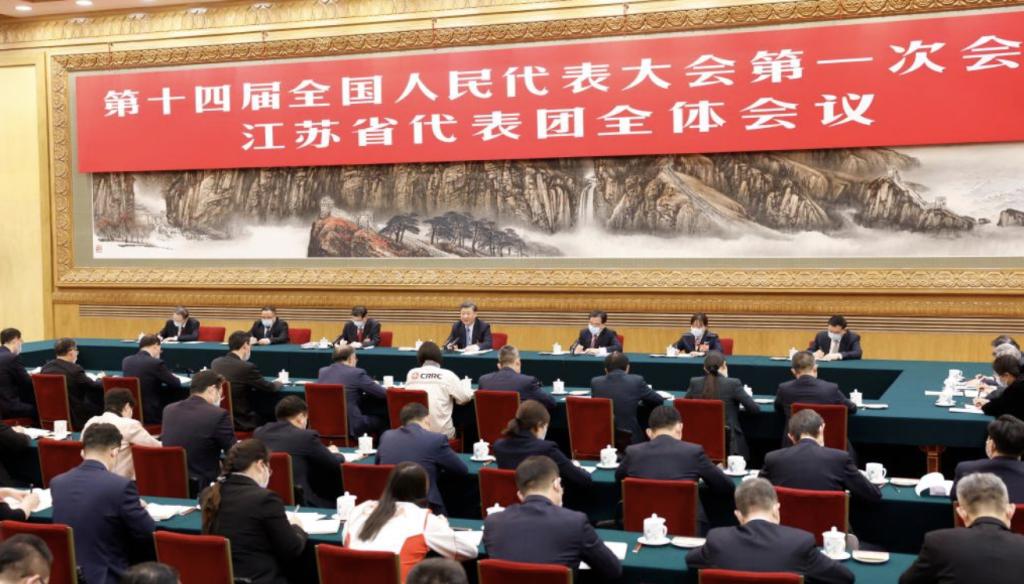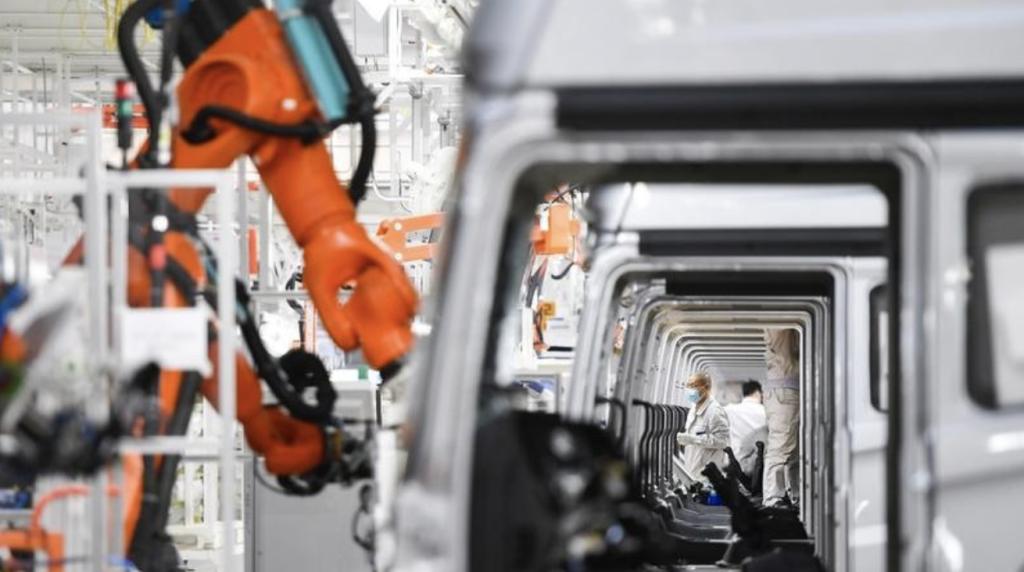Recently, People’s Daily interviewed Professor Yu Miaojie, a deputy to the 14th National People’s Congress, a member of the Standing Committee of the 14th National People’s Congress of Liaoning Province, deputy secretary of the Party Committee and president of Liaoning University. The original text is reproduced as follows:
Why the Manufacturing Industry is an Indispensable Sector to China

Chinese President Xi Jinping, also general secretary of the Communist Party of China Central Committee and chairman of the Central Military Commission, takes part in a deliberation with his fellow deputies from the delegation of Jiangsu Province, at the first session of the 14th National People’s Congress (NPC) in Beijing, capital of China, March 5, 2023. (Xinhua/Huang Jingwen)
Chinese President Xi Jinping on Sunday said the manufacturing industry is an indispensable sector to China at all times.
He made the remarks while attending a deliberation with his fellow deputies from the delegation of Jiangsu Province at the first session of the 14th National People’s Congress, China’s national legislature.
China will strive to develop high-end manufacturing to realize all-around improvement, and provide full support for its development, he said.
To have a more comprehensive understanding of China’s manufacturing industry, we talked with Yu Miaojie, deputy to the 14th National People’s Congress and president of Liaoning University, and He Ping, deputy dean of School of Economics and Management at Tsinghua University, in an exclusive interview in which they have shed some light on the current situation and development of China’s manufacturing industry.
The following are some highlights of the interview.
Question: Why is the manufacturing industry so important to China?
Yu: Manufacturing is key to a country’s ability to avoid the “middle-income trap” in the development process. That is why China has attached great significance to the development of the manufacturing sector over the years. China’s manufacturing-based secondary industry now accounts for about 39 percent of GDP. In the future, the development of China’s service industry must also be based on the development of the manufacturing sector.
He: For a country, the manufacturing industry is an important part of its industrial base. Many products, such as daily necessities, are made through manufacturing. Therefore, the manufacturing industry is indispensable to China. President Xi stressed that China’s manufacturing industry should achieve high-quality development. According to my understanding, first, China’s manufacturing industry must continuously obtain higher added value in the global industrial division of labor. At present, many of China’s low-end manufacturing industries have low added value and are highly replaceable. Therefore, these industries don’t have a favorable position in international trade. Second, high-quality development should also emphasize low-carbon environmental protection in the manufacturing process; Third, high-quality development should also explore ways to solve bottlenecks. Now we are still highly dependent on imports for some core technologies.
Question: As a large manufacturing country, what are the key features of China’s manufacturing development?
Yu: There are two distinctive features of China’s manufacturing development. The first is the complete industrial chain. China is among the few countries that have the most complete industrial chains in the world. The second is industrial agglomeration. Many industrial cities in China have their own industries with competitive advantages, such as machinery and electronics in Shenzhen, South China’s Guangdong province, which are obviously agglomerated.

People work at an intelligent plant for manufacturing the FAW Jiefang J7 trucks in Changchun, Northeast China’s Jilin province, Jan 31, 2023. (PHOTO / XINHUA)
Question: How do you think China can better break the bottleneck in cutting-edge technology and lead China’s manufacturing industry to transform from “manufacturing” to “intelligent manufacturing”?
Yu: There are two keys to break the bottleneck in high-tech. First is to increase the investment in R&D as a proportion of GDP; second, increase the proportion of basic research. The first is to promote the innovation of science and technology, increase the investment in R&D and actively encourage patent innovation. The ratio of R&D investment to GDP has reached 2.55 percent this year, which is close to the average level of 2.6 percent in OECD countries. We still need to continue to strive to reach the level of 3 percent at the end of the 14th Five-Year Plan. Meanwhile, it is important to increase the proportion of basic R&D, that is, the proportion of “R.” The proportion currently has reached the level of 6.5 percent, close to the level of 7 percent set in the 14th Five-Year Plan, but we have to add more effort to reach the level of 10 percent in future development.
He: We must rely on technological innovation and make a breakthrough in core technologies. We also need to build a more complete innovation system, regulatory system and financial regulatory system. We need to raise national awareness of innovation, establish innovation education universally, and realize efficient transformation of scientific and technological achievements. A more improved economic growth model can be finally achieved through all aspects of institutional arrangements.
Question: What do you think are the opportunities and challenges for China’s future development of its manufacturing industry? How can China seize opportunities and meet the challenges of the future?
He: Driven by the digital economy, manufacturing will be deeply integrated with other industries in the future. The course includes the integration of manufacturing industries and service industries. The integrated development is of great importance with the support of various technologies. The future of manufacturing is more than merely making products. So the manufacturing industry not only solves the employment problem itself, but also underlies the modern service industry in the era of the digital economy tomorrow. That’s why the manufacturing industry is still the core and hard power of a country. Driven by big data, blockchain, 5G and many other advanced technologies, it is an unstoppable trend that the manufacturing industry is going to integrate with other industries deeply. The manufacturing industry will become the core foundation of other industries.
The development of the digital technology creates an opportunity for China’s manufacturing industry to take a shortcut. In earlier times we used to endure paths from the third echelon to the second echelon and then catch up with countries of the first echelon. But now, with the support of digital technology, we can jump the second echelon and go directly from the third echelon to the first echelon. That’s why the development of digital technology is so critical. Digital technology can not only create new digital industries, but also bring more comprehensive upgrading, replacement and transformation of traditional manufacturing industries.
Find the article here:
